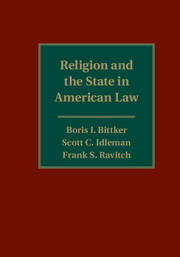Book contents
- Frontmatter
- Dedication
- Contents
- Preface
- 1 History and Introduction
- 2 Church and State in the Nineteenth Century
- 3 Religious Influences and Expressions in Law and Government
- 4 The Establishment Clause
- 5 The Free Exercise Clause
- 6 The Religious Test, Equal Protection, and Free Speech Clauses
- 7 The Definition of Religion
- 8 Church Property Disputes and Church Schisms
- 9 Contracts
- 10 Taxation
- 11 Employment
- 12 Land Use
- 13 Torts
- 14 Criminal Law and Process
- 15 Family Law
- 16 Public Education
- 17 Religious Symbolism on Government Property
- 18 Special Contexts: Prisons and the Military
- Appendix A Federal Constitutional Provisions
- Appendix B State Constitutional Provisions
- Appendix C Selected Federal Statutes 910
- Index
Preface
Published online by Cambridge University Press: 05 October 2015
- Frontmatter
- Dedication
- Contents
- Preface
- 1 History and Introduction
- 2 Church and State in the Nineteenth Century
- 3 Religious Influences and Expressions in Law and Government
- 4 The Establishment Clause
- 5 The Free Exercise Clause
- 6 The Religious Test, Equal Protection, and Free Speech Clauses
- 7 The Definition of Religion
- 8 Church Property Disputes and Church Schisms
- 9 Contracts
- 10 Taxation
- 11 Employment
- 12 Land Use
- 13 Torts
- 14 Criminal Law and Process
- 15 Family Law
- 16 Public Education
- 17 Religious Symbolism on Government Property
- 18 Special Contexts: Prisons and the Military
- Appendix A Federal Constitutional Provisions
- Appendix B State Constitutional Provisions
- Appendix C Selected Federal Statutes 910
- Index
Summary
Religion and the State in American Law provides a comprehensive view of law and religion in the United States. It addresses the traditional First Amendment questions but goes well beyond to cover every area where questions of law and religion intersect. It is designed to be a comprehensive treatise that will enable readers to explore any topic in law and religion from school prayer to tax issues. The book was written over several years with the generous support of the Lilly Endowment.
Law and religion intersect in every area of law in the United States. Sometimes this simply results in the application of a given legal doctrine to religious entities or individuals. In many cases, however, the religious nature of a party affects what courts will consider and enforce. This can be seen in cases involving, for example, property disputes, employment, family law, and criminal law. Moreover, some fields, such as tax law, have complex systems in place to address claims involving religious entities. Exploring these cases from within a given field of law, whether criminal law, torts, or taxation, allows readers to use this book as a research tool for any area of law to see if, and how, the law is applied to cases involving religious entities and individuals.
Religion and the State in American Law was conceived by Boris Bittker, who wrote several chapters but unfortunately passed away before the project was completed. Boris’ idea was to have a comprehensive treatise covering every topic in law and religion. There has never been anyone better qualified to undertake such a task than Boris, and the co-authors Boris brought onto the project, Scott Idleman and Frank S. Ravitch, were humbled to be part of the project and hope that the end result is one with which Boris would have been pleased.
- Type
- Chapter
- Information
- Religion and the State in American Law , pp. xvii - xviiiPublisher: Cambridge University PressPrint publication year: 2015



